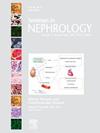Diet and Metabolism in CKD-Related Metabolic Acidosis
Abstract
Metabolic acidosis is a common complication in patients with chronic kidney disease that occurs when the daily nonvolatile acid load produced in metabolism cannot be excreted fully by the kidney. A reduction in urine net acid excretion coupled with a high nonvolatile acid load may play a role in its pathogenesis. Diet is important in generation of the nonvolatile acid load. Acids are produced from metabolism of dietary protein and from the endogenous production of organic anions from neutral precursors. Acids can be balanced by alkali precursors ingested in the diet in the form of combustible organic anions. These typically are reflected indirectly by the excess of mineral cations to mineral anions in a food or diet. These principles underscore widely used methods to estimate the nonvolatile acid load from dietary intake using formulas such as the net endogenous acid production equation and the potential renal acid load equation. Empiric data largely validate these paradigms with high net endogenous acid production and potential renal acid load contributed by foods such as protein, grains, and dairy, and low net endogenous acid production and potential renal acid load contributed by fruits and vegetables along with corresponding dietary patterns. Although further studies are needed to understand the health benefits of altering nonvolatile acid load via diet, this review provides a detailed assessment on our current understanding of the role of diet in chronic kidney disease–related acidosis, providing an updated resource for researchers and clinicians.

 求助内容:
求助内容: 应助结果提醒方式:
应助结果提醒方式:


